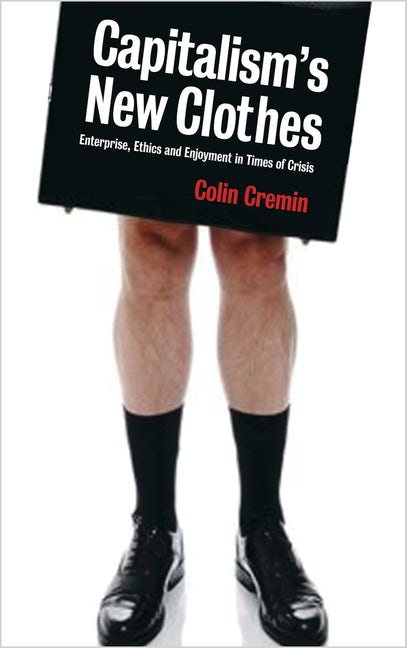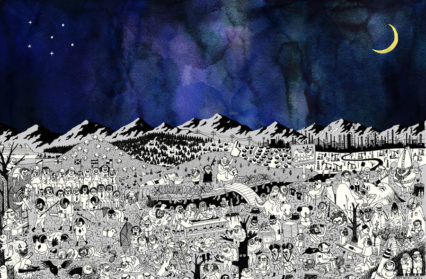Martha O’Brien explores the cognitive dissonance of capitalist society and the climate change crisis through the music industry. Drawing from the examples such as the album Pure Comedy by Father John Misty this article unravels the contradictions between messages of environment consciousness and the medium of capitalist structures and asks how useful infotainment really is in tackling the climate change crisis.
It is no longer (except in conspiracist circles) a point of debate that humans are the primary cause of climate change. The term anthropocene, which emerged in the twentieth century, has gained popularity in the twenty-first as a label which describes the detrimental impact humanity has had on our current geological age. In 2016, however, Marxist ecologist Jason Moore suggested “capitalocene” might be a better label, positing that the climate crisis is a direct result of the exploitative nature of the neoliberal capitalism which dominates Western culture.
If capitalism is understood to be the cause of climate change, the notion that there could be capitalist solutions to the climate crisis may seem counterintuitive. And yet, rather than alternatives to this model of infinite growth, the twenty-first century has seen a push for a so-called ‘green economy’. This term has been adopted by businesses and individuals alike to drive the idea that their ecologically detrimental activity has been mitigated (after all, is the problem of huge corporations’ fuel emissions really that bad if you’ve remembered your tote bag?). Even if the green economy can have positive effects, pushing the message of ‘environmental friendliness’ through the very system that is causing environmental catastrophe is counterintuitive. The message is at odds with the medium sharing it.
This cognitive dissonance – that suggests the problems caused by capitalism can be solved by capitalism itself – is one described by Mark Fisher in Capitalist Realism as ‘the widespread sense that not only is capitalism the only viable political and economic system, but also that it is now impossible even to image a coherent alternative to it’. This acceptance of capitalism in our everyday lives is the cause of the gulf between harmful action and earnest intent – and the reason the entertainment industry has, perhaps incorrectly, positioned itself as a place where the climate change crisis can be battled.
Take, for example, Father John Misty’s 2017 album Pure Comedy. The concept album come-existential tirade discusses the pitfalls of neoliberal capitalism and the modern entertainment industry, and their impact on the human condition. The thirteen-track album examines what it means to be human and despairs over the tendency of humanity to create structures which block and pervert the natural course of life. More specifically, the album identifies the entertainment industry as the branch of neoliberal capitalism which pacifies human questions of existentialism and furthers the decline of human civilisation. The album was accompanied by four single releases, four music videos, a twenty-five minute short film and a world tour. The critical acclaim which the album has received has in large part focused on its lyricism: Leonie Cooper for NME called the album ‘a beautiful, illuminating masterpiece’ upon its release, and said that it ‘sets itself apart by virtue of its lyrics’. And yet, judged in the context of its form, Pure Comedy is the epitome of the neoliberal capitalist cognitive dissonance which Josh Tillman, under his stage persona Father John Misty, berates.

The interdisciplinary field of ecomusicology links the fields of ecocriticism with musicology and examines the discord between medium and message in the music industry. Anthropologist Mark Pedelty writes that ‘the global music industry is faced with a major conundrum: medium is contradicting message’. Pedelty suggests that the music industry is a prime culprit of ‘the cognitive dissonance of contemporary capitalism: a rhetoric of sustainability matched by unsustainable acts of consumption’. While the global music industry as a whole might not have a cohesive aim to become green or ecologically friendly, work like Pure Comedy, and more specifically, the philosophy of the album’s lyrics, appear to aim to fundamentally change the way their listeners conceive of the world, to reconnect them with nature and their natural state. And yet, their medium wholly counteracts their message. A question emerges, then: what messages can we take from so-called eco-conscious albums if their means contradict their message?
Critiques of a capitalist system from within that system cannot be labelled inherently futile: it would be impossible to produce any criticism of the climate crisis that could be globally shared effectively without taking advantage of globalization and technology, which are largely aided and fuelled by neoliberal capitalism. Actions like Greta Thunberg’s, however, who sailed across the Atlantic Ocean to avoid unnecessary CO2 emissions, and who speaks at rallies that are both free and open to the public, demonstrate that there are consciously anti-capitalist modes of critique available, and that these arguably will have more impact and influence because of their revolutionary nature. Moreover, projects like Pure Comedy are not just music albums: they span production, film, performance, and global travel. Tillman, in spreading his anti-capitalist, anti-entertainment message, uses both of those structures for all they’re worth.
A counter-argument to this point would suggest that by harnessing the convenience and mass reach of the capitalist machine, it can be undermined: by spreading a message that critiques capitalism through selling that message, it will reach those that need to hear it most – that is, participants in capitalist society who are not yet worried about its detrimental effects on the ecosphere and their psyche. This does not take into consideration, however, the sheer volume of entertainment available to us in the twenty-first century. How is it possible to spread the intellectual intention of art widely, when it will be lost in the vast sea of entertainment produced in the capitalist entertainment industry? And, since art is subjective, what are the stakes of spreading a political message through music – what’s to say a dislike of the medium won’t turn into a distaste for the message?
 Pure Comedy is not the only project that has used the capitalist entertainment industry as a way to spread an eco-conscious climate change driven message. The 2007 music event, ‘Live Earth’ attempted to increase environmental consciousness through entertainment. But has it really had a lasting effect, or legacy? Has it really made real change – or has it just given those who enjoyed it the fleeting, comfortable feeling that they were doing something ‘good’? Ciara Cremin in Capitalism’s New Clothes suggests that these kinds of performances are limited in their activism by the fact that their form necessitates it is more important that they are entertaining than educational: as she writes, they ‘create the necessary distance for the scientific implications to be absorbed without provoking action to disrupt the show’.
Pure Comedy is not the only project that has used the capitalist entertainment industry as a way to spread an eco-conscious climate change driven message. The 2007 music event, ‘Live Earth’ attempted to increase environmental consciousness through entertainment. But has it really had a lasting effect, or legacy? Has it really made real change – or has it just given those who enjoyed it the fleeting, comfortable feeling that they were doing something ‘good’? Ciara Cremin in Capitalism’s New Clothes suggests that these kinds of performances are limited in their activism by the fact that their form necessitates it is more important that they are entertaining than educational: as she writes, they ‘create the necessary distance for the scientific implications to be absorbed without provoking action to disrupt the show’.
Live performance in the twentieth and twenty-first centuries has become bigger and bigger: the most successful musicians and artists can now expect to travel globally with a full band and set. Talking Heads’s David Byrne expressed his disdain for the unsustainability of music tours with his ‘cost-benefit analysis (100 trucks + x gallons of gas = unsustainable performance)’. Byrne’s equation is an example of ‘offsets’ which arguably fall under what theorist Joanna Zylinska describes as ‘the derangement of scale’ and ‘easy solutionism’. This occurs when individuals perform eco-friendly actions, such as minimising carbon outputs, or even spreading eco-friendly messages, but misunderstand the gulf between the scale of their actions and the disastrous climate crisis. Offsets are not workable. To do something in an ‘eco-friendly way’ is still to do it – not touring at all would be better than touring in an environmentally conscious way.
That conception, however makes existing in an ecologically friendly way in a capitalist society impossible – living itself takes up energy and is an energy output. It is true, though, that minimal ethics and small everyday changes are unlikely to work if big companies do not make a change. The issue here is that this is precisely what Tillman is arguing in Pure Comedy. But, in ‘Leaving LA’, a track from the album, he positions himself as just ‘a white guy in 2017’ . Pure Comedy was not released by Josh Tillman, though. It was released by Father John Misty: a stage persona with an audience he can influence, and money and action he can accrue from that audience. Tillman himself states in an interview for The Guardian, ‘I’m an entertainer, so I’m complicit’. Under both the name of Father John Misty and Josh Tillman, his nihilism positions him as someone incapable of making change despite his platform. The everyday ‘white guy in 2017’ does not perform on a world tour, does not fly across the world, and physically cannot contribute to climate change in the same way as huge corporations (even if he might sometimes forget that tote bag).
All of this discussion is difficult to pin down; to assess whether medium really matters, and to what extent it does. Simply put, yes, it does, inasmuch as to live in an eco-conscious way and to make real change, we must stop with excess carbon outputs; we cannot continue to exploit the earth in the name of entertainment. The buzzword of ‘green economy’ is, however, too weak: we cannot offset the damage that is being done by big corporations. The grip of capitalism in the West is so strong that attempts to shake it can seem futile, and the entertainment industry so overwhelming that it is at risk of being passively consumed. It is vital that before such a shift occurs, attempts are made to ensure that that industry remains critical, intellectual and radical – and, that infotainment pieces about the environment are regarded as persuasions to enlightenment, rather than bleak, nihilistic reflections.
You might also like…
Stephen Reed explores system change as a solution to the climate crisis and critiques capitalist and socialist methods for tackling the environment.
Martha O’Brien is a first year PhD candidate at Cardiff University and the University of Bristol, funded by SWW-DTP. Her research focuses on spectrality in modern Welsh writing in English. She is a co-founder and co-editor of Wales-based arts magazine, nawr.



 Enjoyed this article? Support our writers directly by buying them a coffee and clicking this link.
Enjoyed this article? Support our writers directly by buying them a coffee and clicking this link.







